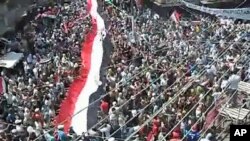Tensions in Syria began to build early in the year with the rise of the Arab Spring protests in Tunisia, Egypt, and other north African and Middle Eastern countries. Syrian government forces have tried to quell the protests in the country with deadly force. Rights groups and activists say at least 1,800 civilians have been killed since the start of the government's crackdown in March. It is hard to verify the accounts of the violence because the government has barred most foreign media from reporting and traveling freely in the country. The Obama administration on Thursday called on the Syrian president to step down.
Timeline of major developments
March 16: Syrian security forces in Damascus break up an opposition protest calling for the release of political prisoners. Some demonstrators are detained.
March 24: The Syrian government announces a series of reforms, including the first suggestion that emergency laws, in place since 1963, might be lifted. Proposed reforms include measures to raise salaries for public employees and fight unemployment.
March 29: The Syrian government resigns, but President Bashar al-Assad remains in power. Rallies in support of the president take place in several cities, including the capital, Damascus.
April 14: President Assad announces a new 31-member government. He orders the release of detainees arrested in the wave of protests, except those convicted of "criminal acts."
April 19: The Syrian government approves an end to emergency laws that ban public demonstrations and restrict the media. President Assad ratifies the decision two days later. But the government threatens harsh reprisals if unrest continues.
April 29: The U.S. imposes new sanctions on Syria, targeting its intelligence agency and two relatives of the president. U.S. officials warn the penalties could be expanded to include President Assad.
May 23: European foreign ministers announce sanctions against President Assad and nine members of his government.
June 20: President Assad blames the uprising on "saboteurs" outside the country. He pledges to hold parliamentary elections, work to create new political parties, and amend the constitution. But he says he will not implement change amid chaos.
June 29: The U.S. Treasury Department imposes sanctions on Syrian security forces in connection with the lethal crackdown on protesters. It accuses agents of Syria's political security unit of opening fire and killing demonstrators in incidents in March and April.
July 7-8: U.S. Ambassador Robert Ford and French Ambassador Eric Chevallier visit the city of Hama to show support for thousands of protesters there.
July 10: Syrian opposition members boycott talks with the government to protest the crackdown on demonstrators.
July 15: A Human Rights Watch official says that some 17,000 people have been detained since March and detention centers are extremely overcrowded. He says his group has documented torture and brutal beatings.
August 7-9: Saudi Arabia, Kuwait, and Bahrain withdraw their ambassadors from Syria. Arab League Secretary General Nabil al Arabi urges Syria to "stop all acts of violence." Turkish Foreign Minister Ahmet Davutoglu meets with President Assad in Syria to call for an end to the violence.
August 17: United Nations Secretary-General Ban Ki-moon speaks by telephone with President Assad, saying he is alarmed at reports of excessive use of force by the government and widespread human rights violations. Ban also calls for an independent investigation of the violence.
August 18: The United States calls for Assad's resignation. U.S. President Barack Obama calls for the Syrian president to step aside and announces new sanctions on Syria. Secretary of State Hillary Clinton says the transition to democracy in Syria has begun and calls on Assad to "get out of the way."
Months of Unrest Led to US Call for Assad to Resign












